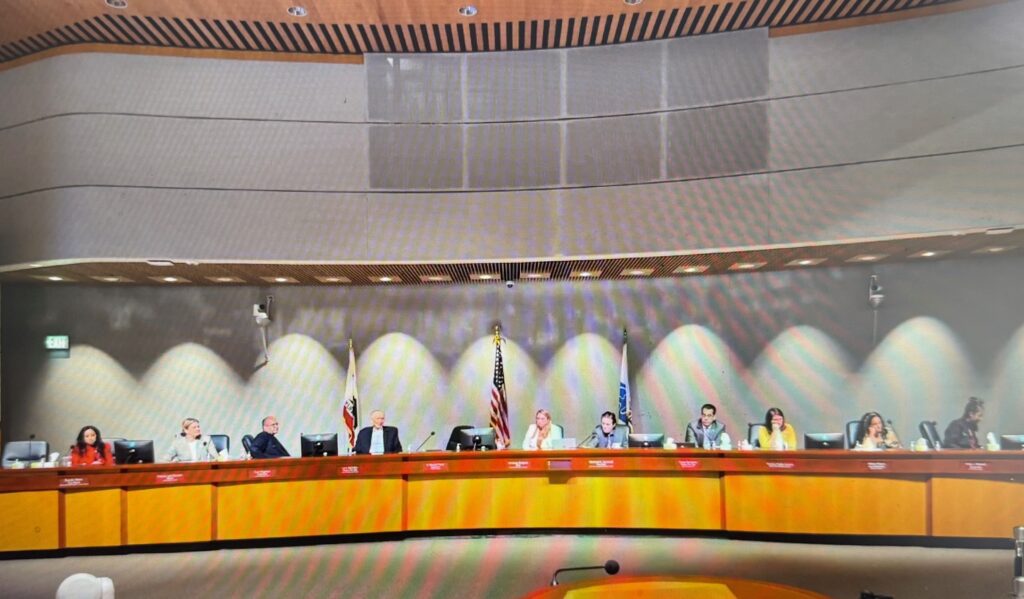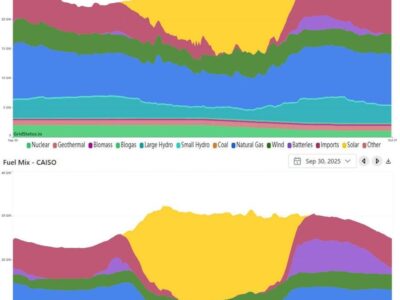Why Did SoCal Air Regulators Reject Clean Air Rules?
SCAQMD’s failure to pass Rules 1111 and 1121 on water heaters and furnaces is a win for gas industry disinformation and a loss for public health.

After 6 hours of public comment and discussion in a packed auditorium, Southern California air quality regulators on Friday rejected a pair of proposals that would have reduced harmful pollution from gas furnaces and water heaters. I watched a livestream of the 6-hour meeting (and provided live updates and commentary on Bluesky). Here’s context and what led up to these public health measures failing.
The South Coast Air Quality Management District Board (SCAQMD) was considering Rules 1111 and 1121, two relatively moderate proposals that have been in the works for more than 2 years. The rules would set gradual zero-emission sales targets for manufacturers of furnace and water heaters — beginning with 30% in 2027 and ratcheting up to 90% by 2036. For gas appliances sold in excess of sales targets, manufacturers would pay surcharges. The rules are part of the SCAQMD’s strategy to reduce the emission of harmful nitrogen oxides (NOx) and fine particles, which contribute to smog.
This vote was closely watched because South Coast AQMD oversees air quality for areas of LA, Orange, Riverside and San Bernardino counties that are home to more than 17 million people. The mission of SCAQMD is to “clean the air and protect the health of all residents in the South Coast Air District through practical and innovative strategies.” One public commenter read this to the board members to remind them of their duty.
The 7-5 vote rejecting their staff’s recommendation came after a coordinated campaign by opponents, including SoCalGas, painting these rules as a “ban” on gas appliances and an attack on Californians’ pocketbooks. Despite the claims of critics, these rules would not force anyone to convert to all-electric models, would not compel the purchase of anything, and would not make gas-powered versions disappear from stores. My colleague Cara Horowitz and I wrote here why policymakers shouldn’t be swayed by these misleading claims.
Before the meeting, US Attorney for the Central District Bill Essayli sent a short, threatening letter warning the board that any action to impede the use of domestic energy resources, including a gas appliance ban, would face a legal challenge by his office.
 At the top of the meeting, SCAQMD staff tried to head off misinformation by giving a presentation about the public health benefits of the two rules, the projected economic costs and savings, as well as the “Myth vs. Facts,” surrounding the rules.
At the top of the meeting, SCAQMD staff tried to head off misinformation by giving a presentation about the public health benefits of the two rules, the projected economic costs and savings, as well as the “Myth vs. Facts,” surrounding the rules.
More than 200 people signed up to give public comments, including a huge showing of public health and environmental advocates who were joined by Smart Local 105, a sheet metal workers’ union in supporting the rules. Representatives from Earthjustice, Sierra Club, Third Act SoCal, East Yard Communities for Environmental Justice, and CHIRLA spoke in favor. So did several residents of the Inland Empire, Santa Monica, and Rancho Palos Verdes, one of the cities that backed the new rules. Many of these speakers talked about the health benefits of the rules — “reasonable nudges” as one person called them — while lamenting that they did not go further or faster. One woman came to the microphone holding her small child and told the board she lived in a mobile home and wanted help to transition away from gas appliances for their health. Another speaker compared this effort to Southern California phasing out backyard trash incineration, which dramatically cleared LA’s air decades ago. DeShawn Samad from Altadena said she hoped the board would help that community “rebuild better” after the climate-fueled Eaton Fire.
A few also addressed the US Attorney’s threat of litigation. “It’s pure grandstanding,” Fernando Gaytan, a lawyer with Earthjustice, told the board. Rejecting these rules “will only embolden the oil and gas industry’s misinformation campaign.”
Matt Vespa, an Earthjustice senior attorney, went further in a comment sent to me during the meeting. “The Trump administration’s Department of Justice is yet again showing its total ignorance and utter disregard for the law with this frivolous letter,” Vespa wrote. “Not only does this rule not prohibit the sale of anything nor deal with building codes, which were at issue in the Berkeley EPCA decision, the South Coast Air Quality Management District is actually required by federal law to develop such regulations to reduce pollution in this region to meet federal air quality standards.”
But opponents — including SoCalGas, real estate interests, and local officials representing OC and Inland Empire cities — gave comment after comment referring to “forced electrification,” gas bans, and appliance mandates that would hurt low-income Californians. The comments were all over the place. One Orange County realtor started complaining about the cost of installing electric vehicle chargers. Another, who described himself as an investor, talked about how “Mr. and Mrs. America are struggling to get by.” A representative of the California Restaurant Association warned that regulations “risk pushing businesses to the brink” though the topic of the day was residential appliances.
In the end, several of the voting board members either bought into those misleading claims or didn’t have the political courage to set the record straight. “This mandate hits really hard,” said OC Supervisor Janet Nyugen before voting no. “I want to let the market do what the market does,” said Riverside Mayor Patricia Lock Dawson in voting no. Yorba Linda Mayor Pro Tem Carlos Rodriguez, who also voted no, said some of his constituents were “ready to run him out of town” over the rules.
The board members who voted no on the rules: Orange County Supervisor Janet Nyugen, Paramount Vice Mayor Brenda Olmos, Riverside Mayor Patricia Lock Dawson, Highland Mayor Pro Tem Larry McCallon, San Bernardino Supervisor Curt Hagman, Yorba Linda Mayor Pro Tem Carlos Rodriguez, Riverside County Supervisor Victor Manuel Perez.
The board members who voted yes: Los Angeles Supervisor Holly Mitchell, LA City Councilmember Nithiya Raman, Board Member Veronica Padilla-Campo, Board Chair Vanessa Delgado, and Vice Chair Michael A. Cacciotti.
When it became clear that the rules did not have the votes to pass, Vice Chair Cacciotti floated the idea of amending the manufacturer sales targets to make them even more gradual. Ultimately the board voted to send the rules back to committee but also said that they would not be tackling the issue “this year.”
There is a sad irony in the SCAQMD rejecting these clean air rules — something that LA Supervisor Holly Mitchell spoke to while voting yes. “We have to make tough decisions on the greater good every day,” Mitchell told her fellow board members. “I think that we have to do what we can as quickly as we can, to get into [air quality] attainment, to avoid federal penalties and to do what’s in the best interest of the public’s health.”
Supervisor Mitchell is right. Southern California has for decades failed to comply with federal air quality standards for smog and could soon be fined. These rules would have helped.
The Clean Air Act requires the Environmental Protection Agency to set standards based on the latest scientific evidence. Believe it or not, we are fast approaching a scenario in which California is sanctioned for non-attainment of federal clean air standards by the same Trump EPA and DOJ that are handcuffing California officials from using the most powerful tools. Though it may seem like the height of hypocrisy, do not underestimate the current administration’s desire to punish California for any failure, even an environmental one.







Reader Comments